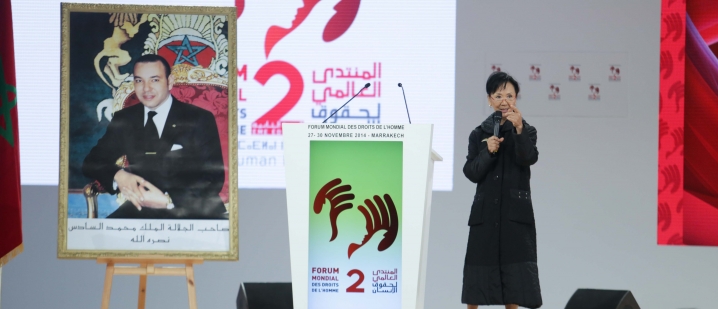20 years after Beijing: still need to change deeply entrenched attitudes and practices perpetuating inequality and discrimination, end impunity and uphold accountability
The participants of a meeting held at the World Human Rights Forum (Marrakesh 2014), on “Women’s rights - From rhetoric to effectiveness: evaluating change 20 years after Beijing”, on the 28th of November, by the Equality Without Reservation Coalition, the National Human Rights Council of Morocco, Women's Learning Partnership (WLP) and UN Women, all agreed that the Beijing Women's Conference was an opportunity for new hopes and aspirations for women’s rights and paved the way for a huge progress in the area. But none ignored the challenges that we still face to effectively promote and protect women’s rights in different parts of the world.
Promoting and protecting women’s rights effectively, they said, is a project of society; a project that must honor the principle of gender equality. This agreement shall not be affected by any circumstances or political changes. Needless to say that mentalities need to change and accountability need to be uphold; there should be no impunity whatsoever when women’s rights are violated.
The participants exchanged on the experiences of several countries in implementing women’s rights in light of the Beijing Declaration and Platform for Action. Some countries led successful campaigns in this area. They were successful, particularly, in fighting discrimination, removing it from all their legislations, encouraging and providing for firm provisions to uphold equality, improving girls’ enrollment in schools, improving participation of women in the job market, promoting political participation of women, etc. The participants also shed light on the progress that has been at the world level since the Beijing Conference, mainly the new international standards for women, peace and security.
Despite this progress, the participants indicated, the world still faces some big challenges in this area. Discrimination against woman persists in many societies in the world and the efforts made to improve education of women are not necessarily reflected as they all hoped in the job market, not to mention the still high maternal mortality ratio in some countries, the weak political participation and economic empowerment, illiteracy, trafficking in persons, mainly girls and women, etc.
The participants made several important recommendations, including strengthening accountability and ending impunity, whenever women’s rights are violated; bridging the gap between laws and policies, on the one hand, and the effective implementation of women’s rights, on the other; lifting all reservations, and prohibiting States from having reservations, on the essential principles and provisions of the Convention against the Elimination of Discrimination against Women (CEDAW); etc.
The Beijing Declaration and Platform for Action were adopted by the Fourth World Conference on Women: Action for Equality, Development and Peace (the Beijing Women’s Conference), held in Beijing (China) on 4-15 September 1995, by the Commission on the Status of Women. The Conference brought together almost 50000 participants, men and women, and emphasized the crucial links between the advancement of women and the progress for society as a whole.
The Declaration “embodies the commitment of the international community to the advancement of women and to the implementation of the Platform for Action, ensuring that a gender perspective is reflected in all policies and programs at the national, regional and international levels.” The Platform for Action sets out measures for national and international action for the advancement of women. It reaffirms that “the advancement of women and the achievement of equality between women and men are a matter of human rights and a condition for social justice and should not be seen in isolation as a women’s issue. They are the only way to build a sustainable, just and developed society. Empowerment of women and equality between women and men are prerequisites for achieving political, social, economic, cultural and environmental security among all peoples.”
The overriding message of the Conference was that the issues addressed in the Platform are universal and global. “Deeply entrenched attitudes and practices perpetuate inequality and discrimination against women, in public and private life, in all parts of the world. Implementation requires, accordingly, changes in values, attitudes, practices and priorities at all levels”, some of these challenges still persist, 20 years after the Beijing Conference!























